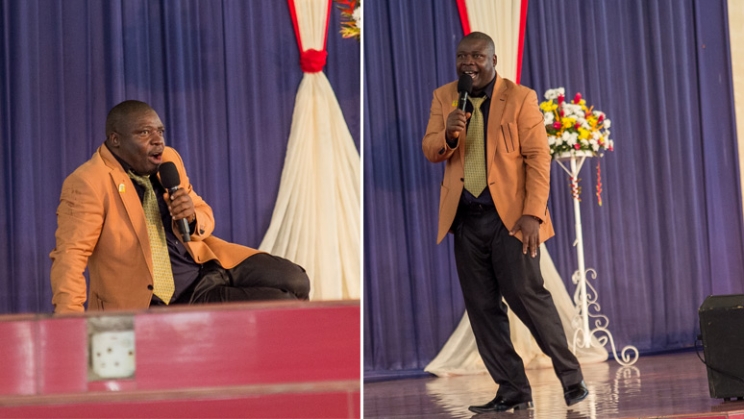June 2017 marked the 36th Anniversary of the Central Healing Service which began on 21st June, 1981. We heard profound testimonies from our brethren, Pastor Ateli Nwankwo, who thanked God for His saving grace upon her life as well as shared her salvation testimony while Elder Anderson Jumbo, recounted God’s healing from spinal disorder. It might interest you to know that this miracle happened in the first healing service of the ministry, 36 years ago. It was also a moment of thanksgiving as we thanked God for all fathers to mark “Father’s Day”. Jubilee voices blessed our souls by acknowledging the mightiness of God in a song titled “Most High”. God’s blessing was indeed profound.
God’s word was brought to us through His servant, Evang. Prince Nkiri, National Minister, GEWC Benin Republic. Speaking on the topic “Broken but not damaged” (2 Samuel 4:4, 9:1-13). The sermon centred on the character of Mephibosheth, the grand-Son of King Saul who was lame from a tender age. Scripture recorded that he was not born lame but while escaping the crisis on the household of King Saul, he fell from his nurse’s hands and became lame.
Analysing the topic, God’s servant defined Broken to mean reduction in something or being separate from a whole either by accident or the like. He also defined broken as something being disconnected in the main frame or a detachment from the original. Furthermore, he pointed out that a broken entity lacks the ability to survive. He described damage as an injury that causes lack of value, however he stated that it is possible for something to be broken, yet not damaged.
To buttress his point stated above, he analysed the subject matter, Mephibosheth, who was of a royal lineage yet was incapacitated and for a while did not enjoy the benefit of his lineage until God, through King David desired to honour him. Other relevant points to note about the character of Mephibosheth include;
- Mephibosheth was handsome, as the bible recorded that his father and grandfather were handsome, so it would be almost impossible not to have such an endearing countenance. Nevertheless, his predicament made this attribute of his to be down trodden.
- As a result of his predicament, he was kept or lived in a desolate place – the house of Machir the son of Ammiel in Lodebar, with no form of communication. This however signifies desertion, since he was a burden.
- Originally, he should have been the king of Israel following the monarchical system that existed in Israel but he lost his estate as a result of the act of his grandfather, Saul.
- The speaker carefully stated how erroneous it was to have a slave share a bed or table with a prince, but Mephibosheth’s condition left him at the mercy of a servant Ziba, who out of his kind heart decided to show him mercy by catering for him.
- His condition made him loose heart and hope in life, as can be deduced from his attitude and statement in 2 Samuel 9:8 “Then he bowed himself and said, what is your servant , that you should look upon such a dead dog as I”
Evangelist Nkiri further stressed on the fact that despite the predicament of Mephibosheth, God favoured him as though he never had a limitation, thus implying that God can change the situation of one who is struggling to become that of revival, as well as restore the value of something no matter how broken it is.
Highlighting the burden on the heart of King David, he stated that it was God who remembered Mephibosheth. He also stated that the covenant David had with Jonathan was being fulfilled because God was involved in it. This covenant made David restore all Saul’s properties to Mephibosheth, as well as adopt him as his own son, hence implying that when God’s favour is on a man, his predicament is a development for a divine transformation, so your destiny (if you are in Christ) cannot be damaged.
Furthermore, the predicament of Mephibosheth did not prevent Ziba and other servants from carrying out David’s instruction of serving Mephibosheth and his children but it was followed to the latter. The blessings on Mephibosheth by David did not only end at the restoration of Saul’s properties but he was also honoured to always eat at the Kings table for the rest of his life. This signified being restored as royalty for Mephibosheth.
Finally, an important point to note amongst these is the significance of the table. God’s servant stated that at the table it was impossible to see the predicament of Mephibosheth as the table hid the lower part of his legs, hence anyone coming to the table only sees him as the son of a king, and treats him as such. Other vital points include;
- Your destiny cannot be damaged because what God says about you must surely come to pass.
- There is a place on God’s table that will change your story. When you are adopted, you would eat bread on His table.
- You cannot eat on God’s table if you are not a son.
- Being brought to the table is being showed and given a royal treatment
- There are treasures waiting for you to become a son. Once you become a son grace begins to work for you, things begin to turn around for you.
- The only guaranty to feasting at God’s table and partaking of his treasures is being born again.









